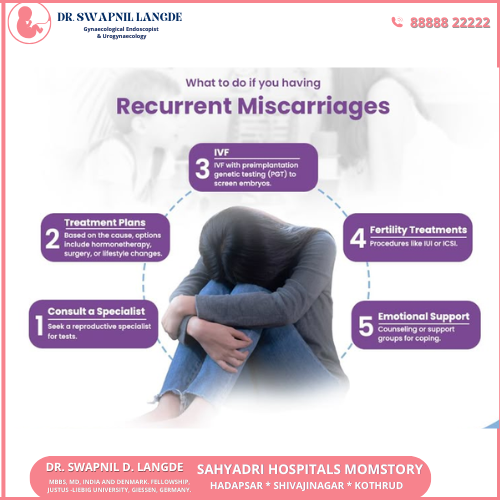Recurrent miscarriages can be an emotionally and physically distressing experience for couples trying to conceive. If you have suffered multiple pregnancy losses, it is important to understand the underlying causes and explore potential treatment options. Dr. Swapnil Langde, a renowned specialist in reproductive health, shares key insights on recurrent miscarriages and how to address them effectively.
Understanding Recurrent Miscarriages
A miscarriage is the loss of pregnancy before 20 weeks. When a woman experiences two or more consecutive miscarriages, it is considered recurrent pregnancy loss (RPL). Identifying the cause of repeated miscarriages is crucial in determining the appropriate treatment and improving the chances of a successful pregnancy.
Common Causes of Recurrent Miscarriages
- Genetic Abnormalities – Chromosomal defects in the embryo can lead to pregnancy loss.
- Hormonal Imbalances – Conditions such as polycystic ovary syndrome (PCOS), thyroid disorders, and luteal phase defects may affect pregnancy maintenance.
- Uterine Abnormalities – Structural issues like fibroids, polyps, or an abnormally shaped uterus can interfere with implantation and fetal growth.
- Autoimmune Disorders – Conditions such as antiphospholipid syndrome (APS) or lupus can cause blood clotting issues leading to miscarriage.
- Infections – Certain infections affecting the reproductive system may increase the risk of miscarriage.
- Lifestyle Factors – Smoking, excessive alcohol consumption, obesity, and high stress levels can contribute to pregnancy loss.
- Blood Clotting Disorders – Thrombophilia and other clotting disorders can lead to inadequate blood supply to the placenta, causing miscarriage.
Steps to Take If You Have Recurrent Miscarriages
- Consult a Specialist
- Seeking medical advice from an expert like Dr. Swapnil Langde can help in determining the exact cause of pregnancy loss and planning appropriate interventions.
- Undergo Medical Evaluations
- Your doctor may recommend genetic testing, blood tests, ultrasound, and hysteroscopy to assess reproductive health and identify potential concerns.
- Address Underlying Health Issues
- Managing thyroid disorders, diabetes, or autoimmune diseases can significantly improve pregnancy outcomes.
- Lifestyle Modifications
- Maintaining a healthy weight, eating a balanced diet, avoiding harmful substances, and reducing stress through meditation or counseling can enhance fertility.
- Medications and Treatment Options
- Depending on the cause, treatment may include hormonal therapy, blood thinners, antibiotics for infections, or surgical corrections for uterine abnormalities.
- Preimplantation Genetic Testing (PGT)
- If genetic abnormalities are suspected, PGT can be performed during IVF to select healthy embryos for implantation.
- Emotional Support and Counseling
- Dealing with recurrent miscarriages can be overwhelming. Joining support groups, seeking therapy, or discussing concerns with your partner can provide emotional relief.
Conclusion
Experiencing recurrent miscarriages can be heartbreaking, but with the right medical guidance and lifestyle changes, many couples can achieve a successful pregnancy. If you have faced multiple pregnancy losses, consult Dr. Swapnil Langde for a thorough evaluation and a personalized treatment plan. Early diagnosis and proper care can significantly improve your chances of carrying a healthy pregnancy to term.

